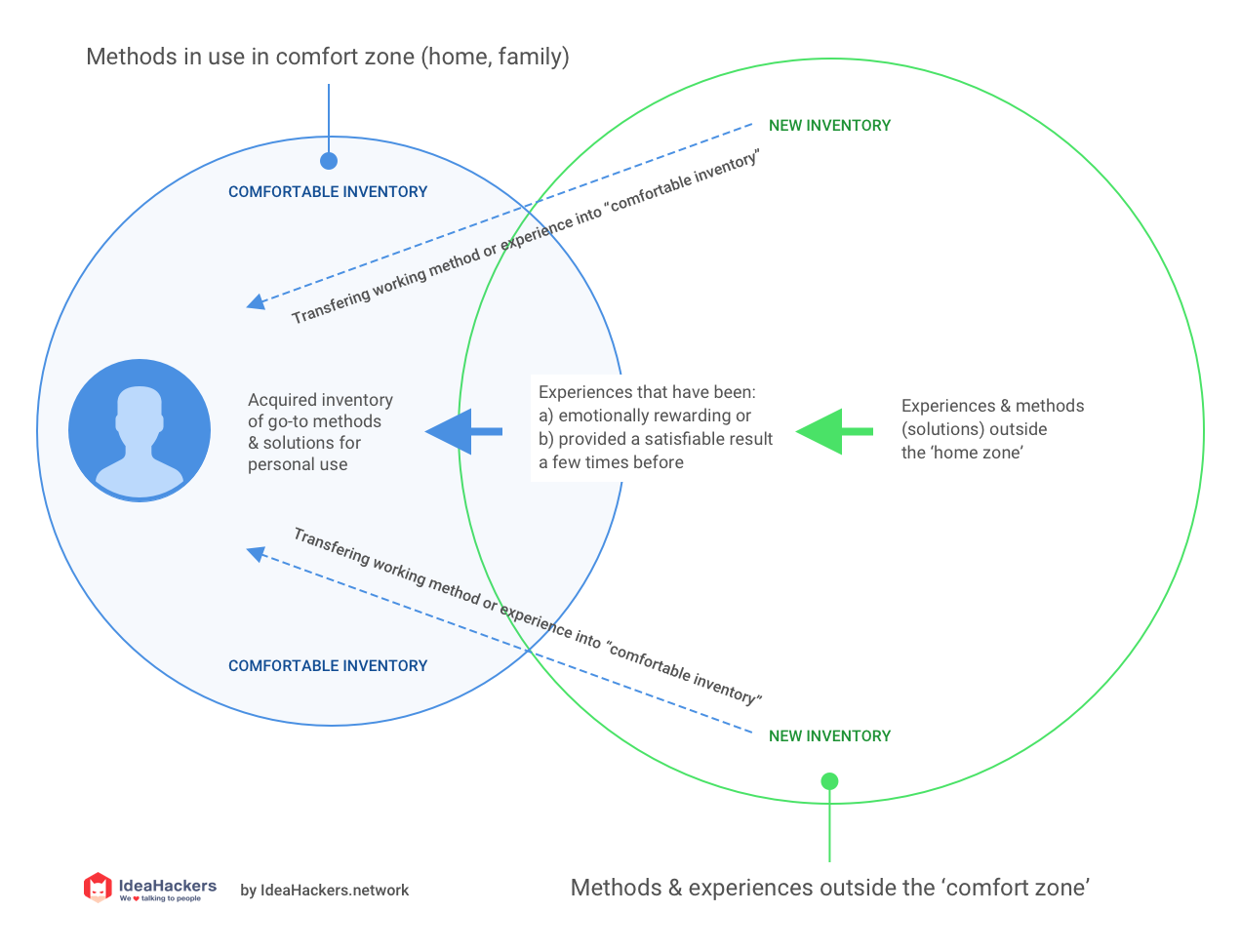Adoption of methods or why Product Owners use Trello for holiday planning?
Did you know that product managers often use Trello for personal holiday planning? Or that event managers do the same but in Excel spreadsheets? That sales guys and Product Owners often track their own "health KPIs" with wearables, exporting and analysing their data quarterly?
Throughout life, people collect different methods of tackling various problems and getting jobs done. As digital tools become more accessible, they get into personal space and the ways of applying them diversify.
People like to adopt optimal ways of doing things. It doesn't matter where they have learned or used the same method originally. These methods are not perfect or delightful. They may contain an acceptable discomfort in regards of time, money or effort to achieve a good outcome. In the customer's eyes, this exchange is fair because these methods are already familiar; it's a "low cost" mental investment. When a particular method has been in use before, then the expectations are more likely to match the outcome. It decreases stress and reduces the chances of failing the task. At least people tend to think so. That's why they use the methods that they have already tried in the past.
- Let me show you how I do it.
- No, I'd rather do it 'my way'.
The "my way" is a way of doing a (similar) job, already familiar to the person as the method that usually delivers a satisfactory outcome. Some of these cumbersome methods fall in the category of "not annoying enough to look for an alternative, or not quite that bad yet". These behaviours are difficult to tackle because a person needs to reassess a preferred way of getting the job done. Yet, these methods aren't habits, as one of our interviewees explains it in the following way:
"Because I used to do performance analysis at work in Excel, I thought I could evaluate my personal goals (yearly) using Excel, in the same way."
Such interesting examples are all around you. Here are a few that illustrate adopting a method (usually for a personal matter) that has been in use before:
An event manager is using Excel spreadsheets to evaluate their yearly goals and set up an action plan, just like they do at work. By copying the method, they bring a successful job-to-be-done experience from their work into personal space.
Corporate fashionistas (operations, marketing and office managers) use Excel spreadsheets to keep track of items they want to buy; they calculate the best selection they can make sorting by price, shipping cost and discount. They copy a way of doing tasks at work, applying this approach for personal situations.
A couple is planning to buy a dog, one of them (a consultant) approached it in the following way. She created Google Slides presentation of dog breeds, their pros and cons, to review it together with her partner. She spent hours on tedious research, in a nutshell - she just applied the same method which she uses at work to present the information for better decision making.
A software developer makes a tool to calculate compound interest because he needs to answer his financial question. After using it himself, he shares it on GitHub. He copies the way of doing it from his software development work and applies it to a personal dilemma. Same goes for portfolio analysis, financial independence calculators and more.
A couple that has recently bought a new apartment attempts to design their future home planning using the game Sims. They are copying the method they used before to create a visualisation of a dream home in Sims.
An event manager has a "date night" or a "couple day" planned in her Google Calendar with a structure around it: who does and prepares what on which week. She copied a scheduling method that works very well for her work.
A cook in a restaurant uses his phone as a TV screen to watch Netflix while he is cooking. It keeps him interested and engaged even when he is doing the same repeated type of work, especially during quiet hours. He copies an experience that works for him at home when he watches and cooks at the same time.
A Business developer who frequently travels for work and stays at the (best) hotels is actively researching and buying smart gadgets to automate his own home: from lighting controls to air re-fresheners.
When you start digging deeper, there are even more curious cases where people use already familiar methods for new jobs-to-be-done.
Translating this article into customer research try asking the following questions:
What are your customer's expectations?
What is already familiar to them?
What has worked in the past?
What do they do in the current situation? Why is this their preferred method to deal with it? Have they ever researched alternatives? What triggered them to do so?
Which other tools do they value or use daily, what can you borrow from these tools? How can your product or design resemble what customers already know and like?
If you have any questions, feedback, ideas and thoughts to discuss, send an email to daria@ideahackers.nl and don’t forget to try the Problem-Solution fit canvas.

